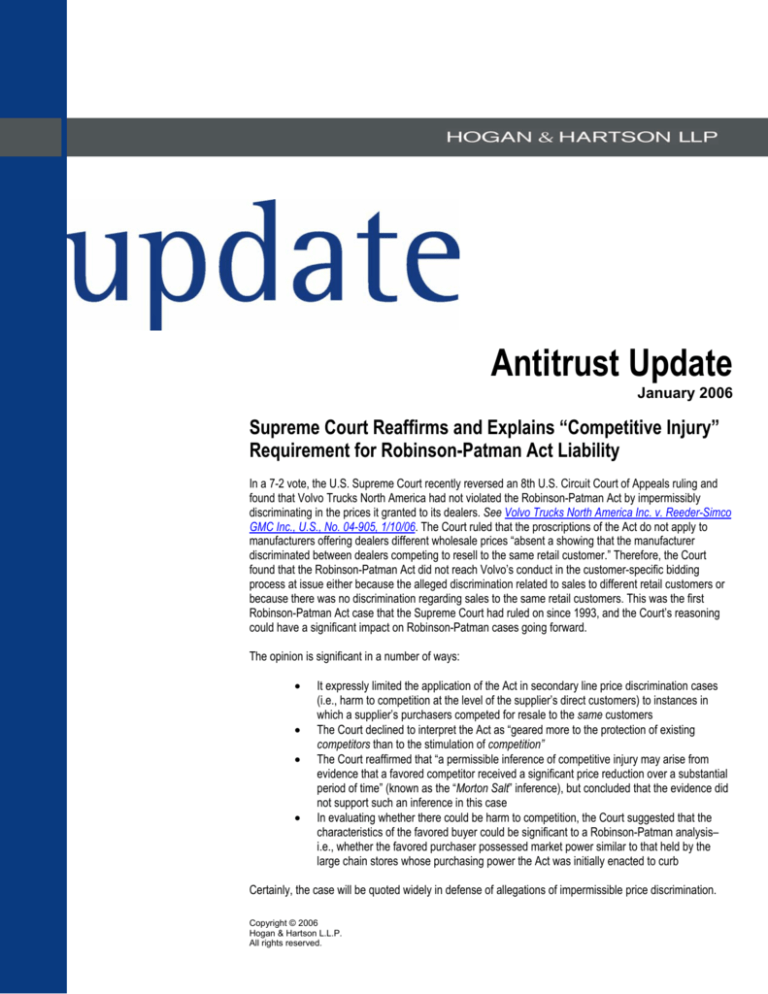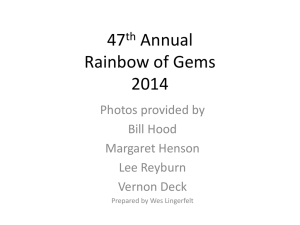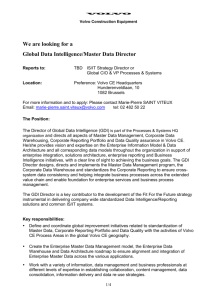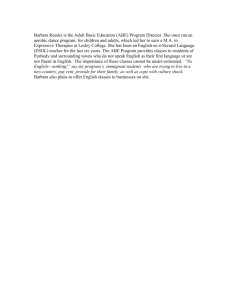
Antitrust Update
January 2006
Supreme Court Reaffirms and Explains “Competitive Injury”
Requirement for Robinson-Patman Act Liability
In a 7-2 vote, the U.S. Supreme Court recently reversed an 8th U.S. Circuit Court of Appeals ruling and
found that Volvo Trucks North America had not violated the Robinson-Patman Act by impermissibly
discriminating in the prices it granted to its dealers. See Volvo Trucks North America Inc. v. Reeder-Simco
GMC Inc., U.S., No. 04-905, 1/10/06. The Court ruled that the proscriptions of the Act do not apply to
manufacturers offering dealers different wholesale prices “absent a showing that the manufacturer
discriminated between dealers competing to resell to the same retail customer.” Therefore, the Court
found that the Robinson-Patman Act did not reach Volvo’s conduct in the customer-specific bidding
process at issue either because the alleged discrimination related to sales to different retail customers or
because there was no discrimination regarding sales to the same retail customers. This was the first
Robinson-Patman Act case that the Supreme Court had ruled on since 1993, and the Court’s reasoning
could have a significant impact on Robinson-Patman cases going forward.
The opinion is significant in a number of ways:
•
•
•
•
It expressly limited the application of the Act in secondary line price discrimination cases
(i.e., harm to competition at the level of the supplier’s direct customers) to instances in
which a supplier’s purchasers competed for resale to the same customers
The Court declined to interpret the Act as “geared more to the protection of existing
competitors than to the stimulation of competition”
The Court reaffirmed that “a permissible inference of competitive injury may arise from
evidence that a favored competitor received a significant price reduction over a substantial
period of time” (known as the “Morton Salt” inference), but concluded that the evidence did
not support such an inference in this case
In evaluating whether there could be harm to competition, the Court suggested that the
characteristics of the favored buyer could be significant to a Robinson-Patman analysis–
i.e., whether the favored purchaser possessed market power similar to that held by the
large chain stores whose purchasing power the Act was initially enacted to curb
Certainly, the case will be quoted widely in defense of allegations of impermissible price discrimination.
Copyright © 2006
Hogan & Hartson L.L.P.
All rights reserved.
Background
The case at issue arose out of a lawsuit that Reeder-Simco, a reseller/dealer of Volvo trucks, brought
against the truck company, alleging that Volvo generally granted other resellers/dealers larger price
concessions than it granted Reeder. Reeder argued that as a result, its sales and profits declined, making
it less competitive. According to Reeder, this violated the Robinson-Patman Act, which makes it unlawful
“to discriminate in price between different purchasers of commodities of like grade and quality” when
certain additional conditions are met. 15 U.S.C. § 13(a). A jury agreed with Reeder, awarding the dealer
more than $1.3 million in damages before trebling. The 8th Circuit upheld the verdict.
Reeder and other Volvo truck dealers generally sold the trucks through a competitive bidding process,
whereby a potential customer would solicit bids from one or more dealers it selected. Customers typically
sought bids from dealers for various manufacturers, and Volvo dealers typically competed against nonVolvo dealers, not each other. When a Volvo dealer received a customer’s request, it would then request
that Volvo grant it a discount off the wholesale price to make its bid more competitive. Volvo’s stated
policy was to grant the same price concession in the atypical event that its dealers were competing for the
same bid.
Reeder’s evidence of discrimination fell into three categories:
1. Comparisons of concessions Reeder received for four successful bids against non-Volvo dealers with
larger concessions other successful Volvo dealers received for different sales on which Reeder did not bid;
2. Comparisons of concessions that Reeder received in connection with unsuccessful bids against nonVolvo dealers with larger concessions other successful Volvo dealers received for different sales on which
Reeder did not bid; and
3. Comparisons of concessions that Reeder received for two head-to-head bids against other Volvo
dealers with the concessions those other dealers received from Volvo.
The Supreme Court’s Opinion
The Court ruled that there could not be any impermissible price discrimination for the first two categories
of alleged discrimination because Reeder did not compete with the “favored” dealer, or beneficiary of the
lower price, for the same customer. Moreover, there was no evidence that the data sample presented was
representative of Volvo’s pricing, as the “compared incidents were tied to no systematic study and were
separated in time by as many as seven months.” The Court added that it would not “permit an inference of
competitive injury from evidence of such a mix-and-match, manipulable quality.” In short, the Court
concluded, Reeder had failed to demonstrate that it lost sales or profits to a favored purchaser.
The Court found the Morton Salt inference of harm inapplicable absent a showing of actual competition
between the favored and disfavored dealers for the same retail customers. Interestingly, the Court
distinguished this case from those involving large chain or department stores, suggesting that the
characteristics of the “favored” buyers may be relevant to the analysis of competitive harm. The Court
implied that competitive harm is more likely to occur when the favored purchaser possesses market
power, noting that through the Robinson-Patman Act, Congress “sought to target the perceived harm to
competition occasioned by powerful buyers . . . .”
The Court also found the evidence lacking with regard to those instances in which Reeder did compete
against another Volvo dealer for a sale to the retail customer. In one of these cases, Volvo increased
Reeder’s initial discount to match that of the other Volvo dealer, and neither dealer was awarded the bid.
Antitrust | 2
These facts thereby eliminated any price discrimination or loss of sales attributable to discrimination as to
that bid. In the second instance, Reeder and the competing dealer were initially offered the same price
concession at the time they submitted their bids. After the competing dealer was awarded the bid, Volvo
increased the discount to that dealer. Therefore, the price difference presumably could not have been the
cause of Reeder’s loss. Volvo and the United States as amicus argued that because Reeder, as a losing
bidder, was not a purchaser in these instances, Robinson-Patman was inapplicable. The Court reasoned
that it need not decide whether Reeder was a “purchaser” under the statute, because Reeder failed to
establish that it was discriminated against, “let alone that the alleged discrimination was substantial” or
was of “such magnitude to affect substantially competition . . . .” (In the case where Reeder lost a bid to
another Volvo dealer, it had alleged a loss of about $30,000 in gross profits.) The Court’s language is
significant, as it may be interpreted as creating a “substantiality” test for competitive injury, which,
although accepted by a number of courts, is not explicit in the statute.
The Supreme Court’s discussion regarding the purpose of the Robinson-Patman Act is quite interesting
and may be used by lower courts to limit the applicability of this much criticized statute. Lower courts have
been divided on the question of whether the Robinson-Patman Act should be applied to protect
competitors or competition. Despite the history of the Act, which was enacted in 1936 to prevent large
chain stores from using their buying power to drive smaller independent stores out of the market, the
Court reasoned that the Robinson-Patman Act is consistent with antitrust law’s “primary concern” of
preserving and fostering interbrand competition. The Court stated,
Even if the Act’s text could be construed in the manner urged by Reeder and embraced by the
Court of Appeals, we would resist interpretation geared more to the protection of existing
competitors than to the stimulation of competition. In the case before us, there is no evidence
that any favored purchaser possesses market power, the allegedly favored purchasers are
dealers with little resemblance to the large independent department stores or chain operations,
and the supplier’s selective price discounting foster competition among suppliers of different
brands.
Still, the Court did suggest that if the conditions necessary for the Morton Salt inference of harm exist (i.e.,
evidence that a favored purchaser received a significant price reduction over a substantial period of time)
along with the other elements of the Act, liability could potentially be found.
On the Horizon
In March 2005 the Antitrust Modernization Commission held hearings to discuss the Robinson-Patman
Act. The Commission is charged by statute to examine whether there is a need to modernize the antitrust
laws and to prepare a report for Congress and the President on this issue. Issues that were adopted for
public comment include the following:
•
Whether the Robinson-Patman Act should be repealed or modified, or its interpretation by the
courts altered. For example:
o “Should private plaintiffs asserting Robinson-Patman claims be required to prove
“antitrust injury,” i.e., proof of injury reflecting the anticompetitive effect of the
challenged conduct?
o Should the inference of harm to competition … recognized in FTC v. Morton Salt Co.,
334 U.S. 37 (1948), be modified, e.g., by requiring plaintiffs to make a showing of
harm to competition similar to that required to establish a Sherman Act violation?”
o “What role should buyer market power play in applying the Robinson-Patman Act?”
Antitrust | 3
70 Fed. Reg. 28902–28907 (May 19, 2005).
http://www.amc.gov/comments/request_comment_fr_28902/Robinson-Patman_comments.pdf
While there are some who advocate repealing the Robinson-Patman Act in its entirety, others support
modifying or clarifying the Act to, among other things, eliminate the criminal provisions and/or clearly
require a showing of injury to competition in order to allege a violation of the Act. The Supreme Court’s
opinion in Volvo may alleviate some of the concerns held by those who wish to modify the Act on this
latter ground, as the clear language of the opinion suggests that reforms through the judicial process may
make it unnecessary to legislate this element of the Act.
*****
For more information about the matters discussed in this Update, please contact the Hogan & Hartson
L.L.P. attorney with whom you work or the attorneys below. If you are interested in any of our other
publications, please visit http://www.hhlaw.com/newsstand.
Philip C. Larson
Erica S. Mintzer
pclarson@hhlaw.com
202-637-5738
esmintzer@hhlaw.com
202-637-5785
This Update is for informational purposes only and is not intended as basis for decisions in specific situations. This information is not
intended to create, and receipt of it does not constitute, a lawyer-client relationship.
Antitrust | 4






